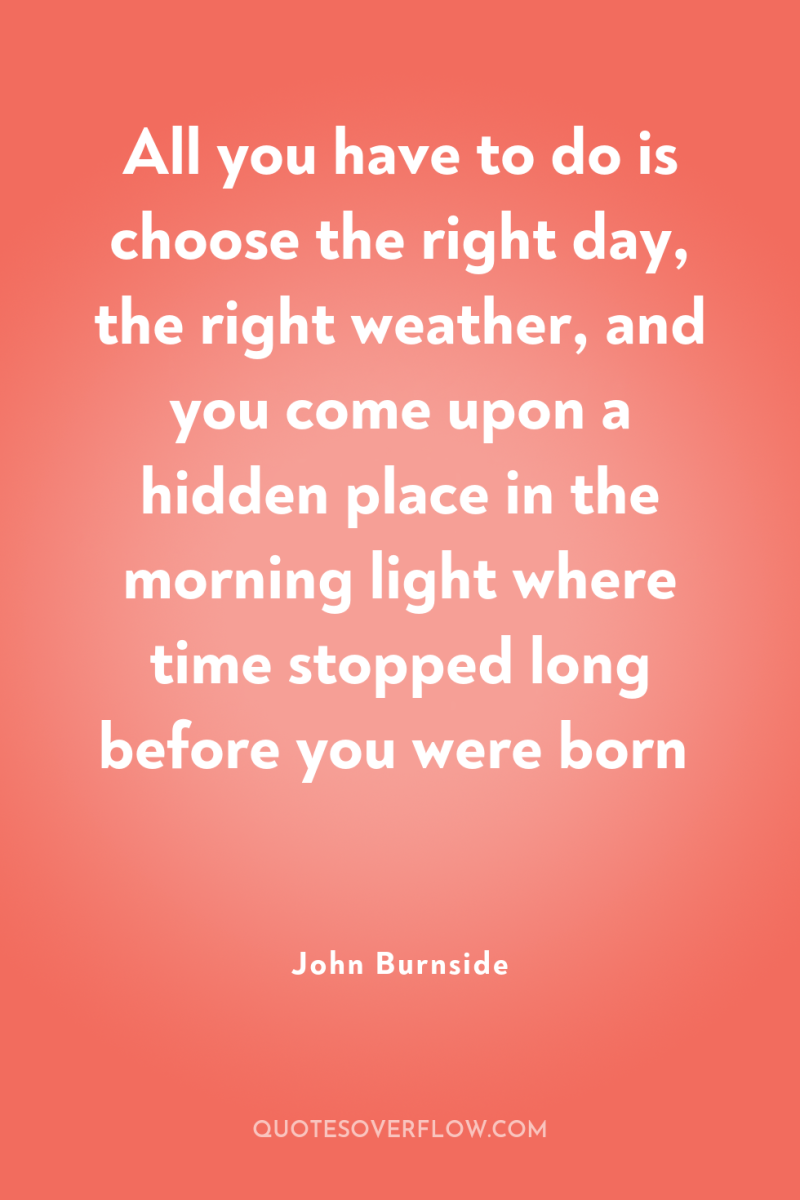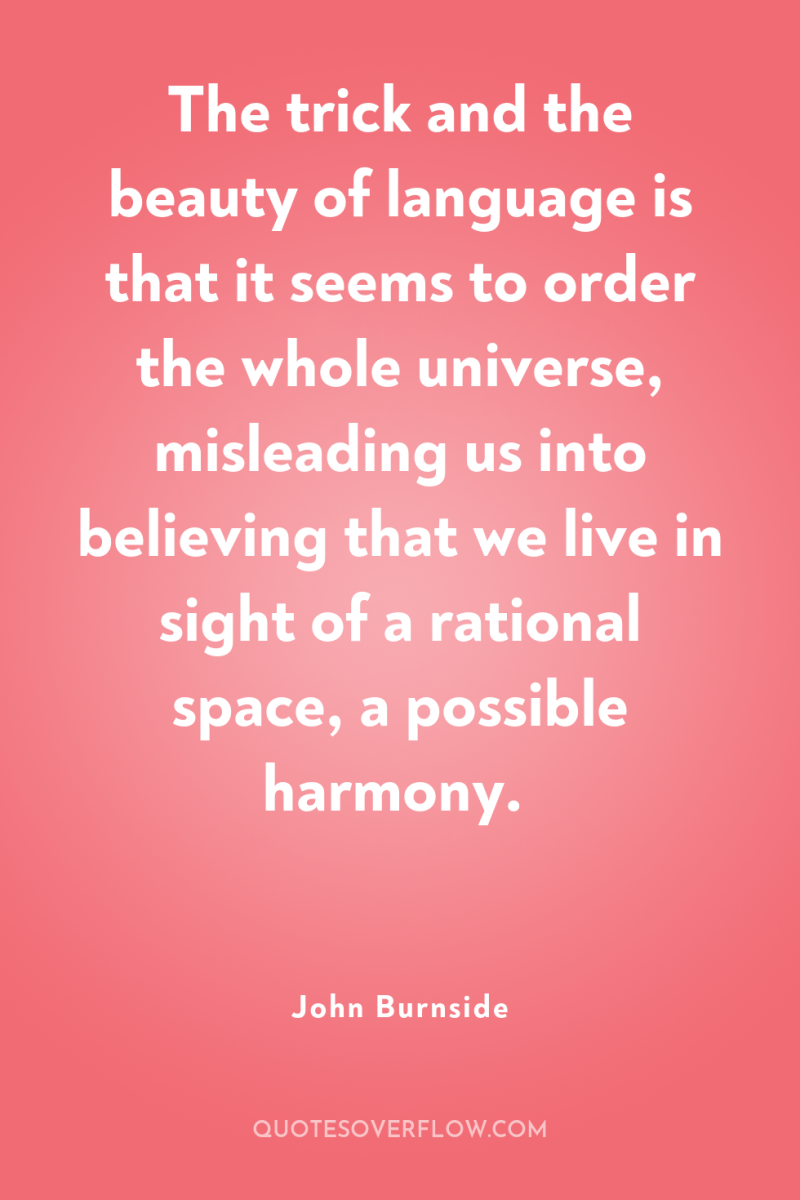
1
All you have to do is choose the right day, the right weather, and you come upon a hidden place in the morning light where time stopped long before you were bornJohn Burnside

2
The trick and the beauty of language is that it seems to order the whole universe, misleading us into believing that we live in sight of a rational space, a possible harmony.John Burnside
3
My father was one of those men who sit in a room and you can feel it: the simmer, the sense of some unpredictable force that might, at any moment, break loose, and do something terrible. [Burnside, p. 27]John Burnside
4
As I child, I came to this idea with a horrified fascination. Once upon a time, I wasn’t here. Before that, my parents weren’t here. And before that…John Burnside
5
If you had to lose everything, what would you miss most? It wouldn't be anything gross, like the big house, or the fancy car, assuming you had such things. It wouldn't be your impeccable reputation, or fame, or the regard of others. No; if you had to lose everything — I mean EVERYTHING — it would be the things you most take for granted now that you would miss. It would be different for each person, and it would probably surprise you to know what it was: a lilac tree in flower, the sound of a train in the distance, the smell of marmalade or hot buttered toast. Rain on a windowpane. A fruit thingummy.John Burnside
6
It's laughable, looking back, to see the processes I went through, pretending to make a reasoned decision. No choice is ever made on the basis of logic; the logic is fabricated around the impulse, the initial desire which is innate and incontrovertible. All the time, I knew where I was going, the elements of my fulfillment or ruin were always present; I only had to work my way into that seam of desire and find the hidden vein of dross or gold. It's not a question of predestination, it's just that free will and destiny are illusions, false opposites, consolations. In the end, they are one and the same: a single process. You choose what you choose and it could not have been otherwise: the choice is destiny. It was there all along, but any alternative you might have considered is an absurd diversion, because it is in your nature to make one choice rather than another. That is identity. To speak of freedom or destiny is absurd because it suggests there is something outside yourself, directing your life, where really it is of the essence: identity, the craftwork of the soul.John Burnside
7
If the components of the body were organs and veins and cells, then the components of thought and language were words and grammar.John Burnside
8
There are days when that dark face is something I can think of as a friend — a primal energy that carries me forward when nothing else will — but more often than not I am face-to-face with a stranger, a companion to something I recognise as myself, sure enough, but one who knows more than I do, thinks less of danger and propriety than I ever have or will, feels a cool and amused contempt for the rules and rituals by which I live, the duties I too readily accept, the compromises I too willingly allow (p. 262) .John Burnside
9
Everything stayed hidden […] it was all secret — known by anyone who cared to know, but unacknowledged, like a priest’s feverish brightness around adolescent boys, or the beatings Mrs Wilson endured on those Saturdays when Dumfermline lost at home(p. 83-84)John Burnside
10
When Mother had told me that animals found quiet, unexposed places to die, I had always imagined they knew they were dying, and accepted it, almost gratefully. Now I saw that this wasn't so at all: they crept into corners in the hope of surviving, they only knew they were weakened and exposed, easy prey, and their instinct was to find a hidden place and try to outlive whatever it was they were suffering. It had been a mistake to imagine they wanted to be alone, to die in peace. Animals have no knowledge of death: for them, death is the unexpected end of life, something they resist by instinct, for no good reason. In that sense their existence has an almost mechanical quality.John Burnside
11
When Mother had told me that animals found quiet, unexposed places to die, I had always imagined they knew they were dying, and accepted it, almost gracefully. Now I saw that this wasn't so at all: they crept into corners in the hope of surviving, they only knew they were weakened and exposed, easy prey, and their instinct was to find a hidden place and try to outlive whatever it was they were suffering. It had been a mistake to imagine they wanted to be alone, to die in peace. Animals have no knowledge of death; for them, death is the unexpected end of life, something they resist by instinct, for no good reason. In that sense, their existence has an almost mechanical quality.John Burnside
12
What the flamingo teaches a child, at that subliminal level where animal encounters work, is that gravity is not just a limitation, but also a possible partner in an intriguing, potentially joyful game.John Burnside
13
This is a truth that should be repeated like a mantra: to have any chance of a ful - filling life, we require not only clean air and a steady climate, but also an abundance of meadows and woodlands, rivers and oceans, teeming with life and the mass existence of other living creatures.John Burnside
14
It is common knowledge now that we depend on insects for our continued existence; that, without key pollinators, the human population would collapse in less than a decade.John Burnside
15
The woods were a boon; all too often, the forest offered danger and mystery. Yet it could be liberating. If you entered that wild place on its own terms, you might be accorded wisdom.John Burnside
16
Poetry stands or falls by its music.John Burnside
17
My poems tend to be more celebratory and lyrical, and the novels so far pretty dark. Poetry doesn't seem to me to be an appropriate tool for exploring that.John Burnside
18
With fiction, I tend to get to my desk and start writing. Poetry I write in my head, often while walking, so that my poems have an organic quality, hopefully.John Burnside
19
I realised I'd spent a lot of time in my poetry trying to find a way of talking about that whereof we cannot speak.John Burnside